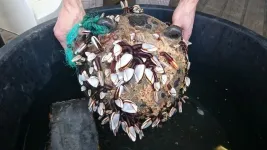Under strict embargo: 16:00hrs GMT Thursday 9 November 2023
Peer reviewed
Experimental study
People and animals
Reducing vitamin B5 slows breast cancer growth in mice
A group of researchers led by the Francis Crick Institute, working with the National Physical Laboratory (NPL) and Imperial College London, have discovered that breast cancer cells expressing a cancer-driving gene heavily rely on vitamin B5 to grow and survive. The researchers are part of Cancer Grand Challenges team Rosetta, funded by Cancer Research UK.
In their research published today in Nature Metabolism, the team studied the metabolic effects of one of the major cancer-driving genes called Myc. In tumour cells where Myc is highly expressed, it disturbs normal processes, drives cell growth and also makes tumour cells dependent on certain nutrients.
These dependencies could be exploited as potential therapeutic targets, but it’s hard to appropriately identify and target metabolic dependencies in human tumours, as Myc expression can vary throughout the tumour.
The researchers developed tumours inside mice with two different types of cells, either with high or low levels of Myc. They also transplanted human breast cancer tumour tissue into mice, which also had a mixture of Myc-high and Myc-low areas.
By using a technique called mass spectrometry imaging, the researchers saw that vitamin B5 was associated with Myc-high areas of both mice and human transplanted tumours. This association was also observed in biopsies taken from patients with breast cancer.
They found that Myc increased the amount of a multivitamin transporter, which allowed more vitamin B5 to enter the cells. When the researchers made the cells produce more molecules which make up the transporter, more vitamin B5 entered the cells, even in Myc-low cells. This was enough to enable faster growth of these cells, just like Myc would normally do.
They then fed mice a vitamin B5-deficient diet, and saw that their Myc-low and Myc-high mixed tumours grew more slowly than tumours in mice who were fed a standard diet. This also happened in the human breast cancer tissue when transplanted into the mice.
The researchers believe that this association with tumour growth is due to the key role vitamin B5 plays in metabolism. Once taken into cells, it is converted into a molecule called coenzyme A, which can then be used in lots of metabolic pathways. This ultimately leads to more energy and the production of materials (like fats, proteins and carbohydrates), enabling the cell to grow.
Although the study links vitamin B5 and tumour growth, it would be too simple to just restrict vitamin B5 intake for people with cancer – vitamins are also important for the immune system to fight back against the tumour. The researchers are now devising strategies to selectively weaken the tumours, without affecting the immune system, to increase the likelihood of a favourable clinical outcome.
Peter Kreuzaler, former postdoctoral researcher in the Oncogenes and Tumour Metabolism Laboratory at the Crick, and now Group Leader at the University of Cologne, said: “Previously, tumour metabolism was measured in bulk, and couldn’t give too many insights into how areas of tumours use molecules like vitamins differently. By using a specialised imaging technique with high resolution in this study, we could see how metabolism differs across a tumour, and that taking away just one vitamin stops a cascade of cancer-driving events. But it’s not yet the full picture – the mice used in this study had a weakened immune system, so next steps are to see the impact of removing vitamin B5 within a strong immune system.”
Tracking vitamin B5 levels could also be used as a biomarker, to help researchers and doctors understand the genetic makeup of a person’s tumour. In collaboration with King’s College London, the team are also developing tracers for vitamin B5 which could be used to identify patients who are more likely to respond to Myc-specific treatments in clinical trials.
Mariia Yuneva, senior group leader of the Oncogenes and Tumour Metabolism Laboratory at the Crick, and co-investigator in the Cancer Grand Challenges Rosetta team, said: “Many people have cancer which doesn’t respond well to treatment or where existing treatments are too toxic. Metabolic dependencies of tumours have been explored as potential therapeutic targets in mouse models of cancer and showed promise. However, human tumours are much more complex. It’s important we understand the role of different genetic profiles, and interactions between the tumours and the body’s own cells, to design effective therapies targeting tumour metabolism in humans.
“Vitamin B5 is needed for normal body functions, so attempting to restrict access to vitamin B5 to the tumour is a fine balance and could have toxic side effects. It is also not an easy task as vitamin B5 is produced by microbes in the gut. But it would be interesting to test how altering vitamin levels make a difference in treatment, or how we can use vitamin B5 metabolism to characterise what type of tumour a person has and whether it will respond to different treatments.”
Cancer Grand Challenges – a global funding initiative co-founded by Cancer Research UK and the National Cancer Institute in the US – unites the world’s greatest minds to take on cancer’s toughest challenges. Team Rosetta, which was funded by Cancer Research UK, has been addressing the challenge of mapping cancer at the molecular and cellular level, with the aim to transform how we understand and treat cancer.
David Scott, Director of Cancer Grand Challenges, said: "It's fantastic to see how the Rosetta team is applying the mass spectrometry imaging pipeline it has developed to better understand tumour metabolism, revealing important insights into the effects of vitamin B5 on tumour growth.
"At Cancer Grand Challenges, we are proud to support discovery science like this, which we hope will ultimately be able to help inform new treatment strategies to improve outcomes for people affected by cancer."
-ENDS-
For further information, contact: press@crick.ac.uk or +44 (0)20 3796 5252
Notes to Editors
Reference: Kreuzaler, P. et al. (2023). Vitamin B5 supports Myc oncogenic metabolism and tumour progression in breast cancer. Nature Metabolism. 10.1038/s42255-023-00915-7.
Mariia Yuneva is a co-investigator in the Cancer Grand Challenges Rosetta team, funded by Cancer Research UK. In 2015, Cancer Grand Challenges set the 3D tumour mapping challenge, with the aim of finding a way to map tumours at the cellular and molecular level. The Rosetta team was awarded funding in 2017 to take this challenge on and has been working to develop an imaging pipeline that can zoom in from the whole tumour right down to individual metabolites inside cells.
About the Francis Crick Institute
The Francis Crick Institute is a biomedical discovery institute dedicated to understanding the fundamental biology underlying health and disease. Its work is helping to understand why disease develops and to translate discoveries into new ways to prevent, diagnose and treat illnesses such as cancer, heart disease, stroke, infections, and neurodegenerative diseases.
An independent organisation, its founding partners are the Medical Research Council (MRC), Cancer Research UK, Wellcome, UCL (University College London), Imperial College London and King’s College London.
The Crick was formed in 2015, and in 2016 it moved into a brand new state-of-the-art building in central London which brings together 1500 scientists and support staff working collaboratively across disciplines, making it the biggest biomedical research facility under a single roof in Europe.
http://crick.ac.uk/
About Cancer Grand Challenges
Co-founded in 2020 by two of the largest funders of cancer research in the world: Cancer Research UK and the National Cancer Institute, Cancer Grand Challenges supports a global community of interdisciplinary, world-class research teams to come together, think differently and take on some of cancer’s toughest challenges. These are the obstacles that continue to impede progress, and no one scientist, institution, or country will be able to solve them alone. With awards of up to £20M, Cancer Grand Challenges teams are empowered to rise above the traditional boundaries of geography and discipline to make the progress against cancer we urgently need.
About Cancer Research UK
Cancer Research UK is the world’s leading cancer charity dedicated to saving lives through research, influence and information.
Cancer Research UK’s pioneering work into the prevention, diagnosis and treatment of cancer has helped save millions of lives.
Cancer Research UK has been at the heart of the progress that has already seen survival in the UK double in the last 40 years.
Today, 2 in 4 people survive their cancer for at least 10 years. Cancer Research UK wants to accelerate progress and see 3 in 4 people surviving their cancer by 2034.
Cancer Research UK supports research into the prevention and treatment of cancer through the work of over 4,000 scientists, doctors and nurses.
Together with its partners and supporters, Cancer Research UK is working towards a world where people can live longer, better lives, free from the fear of cancer.
For further information about Cancer Research UK's work or to find out how to support the charity, please call 0300 123 1022 or visit www.cancerresearchuk.org. Follow us on Twitter and Facebook.
END


